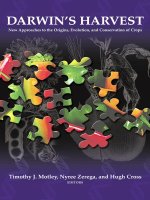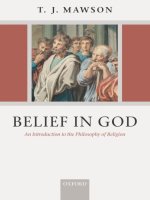- Trang chủ >>
- Khoa Học Tự Nhiên >>
- Vật lý
the god of metaphysics jun 2006
Bạn đang xem bản rút gọn của tài liệu. Xem và tải ngay bản đầy đủ của tài liệu tại đây (2.78 MB, 597 trang )
The God of Metaphysics
This page intentionally left blank
The God of Metaphysics
Being a Study of the Metaphysics
and Religious Doctrines of Spinoza,
Hegel, Kierkegaard, T. H. Green,
Bernard Bosanquet, Josiah Royce,
A. N. Whitehead, Charles Hartshorne,
and Concluding with a Defence of
Pantheistic Idealism
T. L. S. Sprigge
CLARENDON PRESS Á OXFORD
3
Great Clarendon Street, Oxford OX2 6DP
Oxford University Press is a department of the University of Oxford.
It furthers the University’s objective of excellence in research, scholarship,
and education by publishing worldwide in
Oxford New York
Auckland Cape Town Dar es Salaam Hong Kong Karachi
Kuala Lumpur Madrid Melbourne Mexico City Nairobi
New Delhi Shanghai Taipei Toronto
With offices in
Argentina Austria Brazil Chile Czech Republic France Greece
Guatemala Hungary Italy Japan Poland Portugal Singapore
South Korea Switzerland Thailand Turkey Ukraine Vietnam
Oxford is a registered trade mark of Oxford University Press
in the UK and in certain other countries
Published in the United States
by Oxford University Press Inc., New York
ß T. L. S. Sprigge 2006
The moral rights of the author have been asserted
Database right Oxford University Press (maker)
First published 2006
All rights reserved. No part of this publication may be reproduced,
stored in a retrieval system, or transmitted, in any form or by any means,
without the prior permission in writing of Oxford University Press,
or as expressly permitted by law, or under terms agreed with the appropriate
reprographics rights organization. Enquiries concerning reproduction
outside the scope of the above should be sent to the Rights Department,
Oxford University Press, at the address above
You must not circulate this book in any other binding or cover
and you must impose the same condition on any acquirer
British Library Cataloguing in Publication Data
Data available
Library of Congress Cataloging in Publication Data
Data available
Typeset by SPI Publisher Services, Pondicherry, India
Printed in Great Britain
on acid-free paper by
Biddles Ltd,
King’s Lynn, Norfolk
ISBN 0–19–928304–4 978–0–19–928304– 0
13579108642
This book is dedicated to
St Mark’s Unitarian Church, Edinburgh
This page intentionally left blank
Preface
In this book a number of metaphysical systems are examined in such
detail as is practicable. There are probably only a few of my hoped for
readers who are at home with each and all of them, and so most readers
should learn something about a significant philosophical system not very
familiar to them. However, the book is intended also as a contribution to
the continuing debate about these thinkers among the cognoscenti.
What links these systems together is that each provides a case for a
religious view of the world based on rational or would-be rational argu-
ment. That a seriously religious perspective on things can derive, or win
important support, from metaphysics is denied by many thinkers—for
example, by Blaise Pascal (criticizing especially Rene
´
Descartes), by Søren
Kierkegaard (criticizing especially Hegel and Hegelians), and by William
James, John Macmurray, and others. According to such thinkers, a God
whose existence is supposed to be demonstrated in a philosophical treatise
is not the God of ‘Abraham, Isaac and the Christians’ or (so those not
thinking exclusively from the point of view of Judaeo-Christianity may
add) of any actual or possible living religious faith at all. In the light of
this, the present book examines some of the metaphysical systems which
their authors did think of as offering some kind of demonstration of (or at
least a philosophical locus for) religious truth, whether Christian or other-
wise. Thus it sets out to test the objections to what might be called
‘metaphysical religion’ by investigating the works, and even to a limited
extent the lives, of some of those who may be thought to have advanced
something of that sort (as well as probably the best critique of such efforts
by Kierkegaard in his attack on ‘Hegelian Christianity’). However, the
investigation of the metaphysical systems is also for its own philosophical
sake. I do not engage in the kind of lofty evaluation, as from a higher
authority, of these metaphysical systems and the arguments in support of
them, that, as I fear, some commentators do today. My more difficult aim
has been to promote understanding of, and interest in, the systems and
their relation to religious issues, and to criticize only for the sake of
advancing this aim. My own views on metaphysics and religion are given
in Chapter 9.
The reader should realize that I am aware that it may be thought cheek
to investigate, and even propound, general views of reality and say little
about how they relate to the scientific conceptions of today, which may be
thought to be the most important clues we have as to the nature of things.
This is a reasonable charge. From this point of view, I think that the ideal
thinker on such general matters is someone scientifically well equipped
but also aware of the way in which metaphysicians have grappled with
these issues. Of all the thinkers studied here, Whitehead was the best
equipped to do this, though Spinoza was well equipped in relation to the
science of his day. Einstein’s general theory of relativity would have
appealed, I think, to Spinoza, while Whitehead’s philosophy fits well, I
believe, with quantum physics. More generally, one can only work at what
one is capable of, and this is what I have done, believing that the product is
not entirely worthless.
My main helpers in writing this book have been the philosophers them-
selves and some commentators. I have had some help, for which I am most
grateful, with several chapters from John Llewelyn especially on Hegel;
from Alastair Hannay on Kierkegaard; from William Sweet on Bosanquet;
from John Clendenning on Royce; from John Cobb, Pierfrancesco Basile
and Michel Weber on process thought and over the years from Leemon
McHenry on process thought and much else. Most of these have not seen
my text and are not to blame for it, but they have helped me much, either
in discussion or in answers to my e-mail questions. I should also say how
valuable it has been to be able to meet and talk with fellow idealists, or
idealist scholars, from around the world in a series of conferences at Harris
Manchester College, mostly organized by Bill Mander (himself a notable
contributor to idealist philosophy), on current and historical idealist
trends in philosophy. I am afraid that I am not a great reader of philosoph-
ical articles (as opposed to books) just as I avoid reading short stories.
Neither of these forms allows one to immerse oneself in another’s world,
but acts only so as to jerk one out of one’s own. So I apologize to all those
who have written on the philosophers studied here in that medium for
any apparent failure to take account of their work. I may well have read
their articles, but they tend to float away from my conscious mind, though
probably exerting some influence on my conscious thought. This is not
the case (I think) with books. I am also grateful to all those with whom I
have discussed philosophical and religious issues over the years, but it
would be invidious to pick out any of them especially, with the exception
Preface
viii
of my late brother Robert, from whom I have learnt so much on philo-
sophical and religious matters. I am also deeply appreciative for all the
help of very various kinds which I have had from my wife, Giglia.
There is a separate bibliography for each chapter which gives abbrevi-
ations in square brackets for books used in the text. These abbreviations
are in small capitals. Sometimes when an author’s name does not appear in
the text, it is used for the reference. Some repetition across chapters should
make them independently intelligible.
T. L. S. S
PRIGGE
Preface
ix
Acknowledgements
Quotations from Spinoza, Complete Works, with translations by Samuel
Shirley (Indianapolis: Hackett Publishing Company, 2002), appear here by
kind permission of Hackett Publishing Company, Inc.
Quotations from Spinoza, Tractatus Theologico-Politicus, translated by
Samuel Shirley (Leiden: E. J. Brill, 1991), appear here by kind permission
of E. J. Brill.
Quotations from G. F. W. Hegel, Early Theological Writings, translated by
T. M. Knox (Philadelphia: University of Pennsylvania Press, 1948), appear
by kind permission of the University of Pennsylvania Press.
Quotations from Søren Kierkegaard, Concluding Unscientific Postscript to
Philosophical Fragments, translated by H. V. Hong and E. H. Hong. ß 1992
Princeton University Press. Reprinted by permission of Princeton Univer-
sity Press.
Quotations from Charles Hartshorne, Creative Synthesis and Philosophic
Method (London: SCM Press Ltd, 1970), appear here by kind permission of
SCM Press, Canterbury.
I am extremely grateful to OUP for accepting this book, and to the two
anonymous readers for some good advice.
Summary Contents
Chapter 1 Introductory 1
Chapter 2 The God of Spinoza 17
Chapter 3 Hegelian Christianity 96
Chapter 4 Kierkegaard and Hegelian Christianity 167
Chapter 5 T. H. Green and the Eternal Consciousness 223
Chapter 6 Bernard Bosanquet 270
Chapter 7 Josiah Royce 357
Chapter 8 Process Philosophy and Theology:
Whitehead and Hartshorne 409
Chapter 9 Pantheistic Idealism 473
Chapter 10 Concluding Remarks 534
Bibliography 545
Index 563
This page intentionally left blank
Detailed Contents
Chapter 1 Introductory 1
I Metaphysical Religion and its Critics 1
II Descartes 4
III The Meaning of ‘God’ and the Idea of the Absolute 6
IV What Religion Is and what it may Do for Us 8
V Worship and Prayer 11
VI The Religious Relevance of a Metaphysical God 12
VII Texts 14
VIII Good and Bad Religion 15
Chapter 2 The God of Spinoza 17
Part One: Life of the Philosopher 17
Part Two: Thought of the Philosopher (the ETHICS)24
I The Aim of Part 1 of the Ethics 24
II There is Just One Substance 25
III How Finite Things are Related to the One Substance 26
IV How a Thing Relates to its Essence 28
V God-or-Nature is through and through both Physical
and Mental; thus it is Mentally Aware of Everything
which it is Doing Physically 29
VI The Attributes of Substance: Different Interpretations 31
VII God’s Infinity 32
VIII Proofs of the Uniqueness and Necessary Existence of God 33
IX Alternative Proof of God’s Necessary Existence 40
X Further Remarks on Essences 42
XI The conatus 43
XII The Divine Freedom 44
XIII Freedom as Determination by Adequate Ideas,
i.e. by Rational Thought 46
XIV Rational and Irrational Minds 47
XV What Distinguishes One Finite Mind from
Another as Ideas in the Divine Mind? 49
XVI Emotion and Perception 50
XVII Spinoza’s Determinism 53
XVIII Absolute and Relative Necessity 54
XIX Determinism does not Make Careful Decision
Making Pointless 55
XX Belief in Determinism should Make for Tolerance 57
XXI Is the Universe Perfect, Properly Understood? 57
XXII Spinoza’s Chief Ethical Doctrines 58
Part Three: Spinoza on Organized Religion and the Reduction
of Religious Strife 64
XXIII The Universal Religion 64
XXIV Spinoza on Jesus and on Salvation 67
XXV Spinoza’s Inter-faith Message for Today 69
Part Four: Spinozism as a Personal Religion 70
XXVI Could Spinozism Function for Some People as a
Personal Religion? 70
XXVII The Intellectual Love of God 70
XXVIII God as the Infinite Physical Universe 75
XXIX God as Infinite Mind 76
XXX Human Immortality or Mortality 80
XXXI Further Remarks on Time and Eternity 83
XXXII In What Sense is God Perfect? 85
XXXIII Determinism as a Religious Doctrine 88
Part Five: Conclusion 91
Chapter 3 Hegelian Christianity 96
Part One: Interlude—Immanuel Kant 96
Part Two: Hegel as a Person 98
Part Three: Hegel’s Early Thought 101
a. The Tu
¨
bingen Period (1788–1793) 102
b. The Berne Period (1793–1796) 103
c. The Frankfurt Period (1797–1800) 104
d. The Jena Period (1801–1807) 108
Detailed Contents
xiv
Part Four: The Final System 109
Introductory 109
Outline of the Dialectic 114
A The Logical Idea 114
A1 Being 116
A2 Essence 119
A3 The Notion 123
B The Idea Outside Itself, or Nature 131
C Spirit or the Idea In and For Itself 134
C1 Subjective spirit 135
C2 Objective Spirit 140
C3 Absolute Spirit 145
C3.1 Absolute Spirit Revealing itself in Art 145
C3.2 Absolute Spirit Revealing itself in Religion 147
C3.3 Absolute Spirit Revealing itself in Philosophy 155
Part Five: Conclusion 156
The Anti-climactic Feature of Hegelianism 156
James Yerkes on Hegel’s Christianity 161
Chapter 4 Kierkegaard and Hegelian Christianity 167
Part One: Philosophical Fragments 167
I On the Provenance and Pseudonymous Authorship
of Philosophical Fragments 167
II The Socratic (and Hegelian) Perspective on Religious
Knowledge and Experience 168
III Transition to an Alternative (the Christian)
Point of View: The Incarnation 170
IV The Paradox of the Moment 171
V Where Hegelianism is Un-Christian 172
VI Necessity and Contingency 172
VII Original Sin 173
VIII The Disciple at Second Hand 174
IX Comment On All This 175
Part Two: Concluding Unscientific Postscript 176
X Outline of Unscientific Postscript 176
XI Religiousness A and Religiousness B 179
XII Why be Interested in Christianity? 181
XIII Objective and Subjective Truth 182
Detailed Contents
xv
XIV More on the Paradoxical and Absurd Nature of
Christianity 189
XV Christianity is Sticking by Absolute Faith to the
Paradox and the Absurdity 191
XVI More contra Hegelian Christianity 192
XVII On Becoming Subjective and Away from Objectivity 202
XVIII Original Sin Again and Children 204
XIX How Hard on the Ages before Jesus Christ:
How does Kierkegaard Relate to Damnation? 209
XX Is the Religious and Ethical Viewpoint of Kierkegaard/
Climacus Essentially Egotistical? 210
XXI Works of Love 212
XXII We should Live the Religious Life without its being
Clear from our Behaviour that we are Doing so 214
XXIII Bourgeois Christianity and Christian Suffering:
Christianity Not Cosy 217
XXIV How Friendly is Kierkegaard’s God? 219
XXV Concluding Remarks 219
Chapter 5 T. H. Green and the Eternal Consciousness 223
I Absolute Idealism 223
II T. H. Green 225
III Green and Bosanquet 227
IV Green and the Welfare State 228
V Grounds of Green’s Idealism: Background 228
VI Green’s Implicit Event Ontology 230
VII The Human Mind is not Merely Something in the
Story but is Part of the Story-Teller 232
VIII The Case for Green’s Idealism in more Detail 233
IX Green’s Psychology and Ethics 237
X A Problem about Animals 245
XI The Eternal Consciousness and Human Responsibility 246
XII Comparison of Virtue Ethics and Utilitarianism 249
XIII The Superiority of Virtue Ethics 251
XIV From Aristotle to Christianity 252
XV Negative and Positive Freedom 256
XVI Green’s Idealism and Religion 259
XVII Green’s Philosophy and Christianity 260
XVIII The Overall Religious Significance of Green’s Philosophy 261
XIX Decline of Green’s Reputation 265
Detailed Contents
xvi
Chapter 6 Bernard Bosanquet 270
Part One: Earlier Work 270
I Introducing Bernard Bosanquet 270
II Bosanquet and Christianity 273
III The Future of Religious Observance 285
Part Two: Later Work 289
IV A Brief Sketch of the Metaphysics of F. H. Bradley 289
V Contrasts and Affinities between Bosanquet
and Bradley 292
VI Two Tensions in Bosanquet’s Thought 294
VII Some Terminological Clarifications:
‘Consciousness’, ‘Experience’, and ‘Materialism’ 294
VIII Materialist Tendencies in Bosanquet’s Principle of
Individuality and Value 298
IX Laws of Nature 302
X Contradiction and Wholeness 304
XI The Emergence of Mind from Nature 307
XII Hegelian versus Bradleyan Loyalties 309
XIII Does Nature Only Exist as the Posit of Finite Mind? 311
XIV Bosanquet on Panpsychism 315
XV The World should be Interpreted Teleologically
in a Deep Sense of ‘Teleological’ 317
XVI The Problem of Evil 321
XVII Bosanquet’s Conception of Value 327
XVIII Proof of the Existence of the Absolute 331
XIX Time and the Absolute 333
XX Bosanquet and the State 336
XXI What was Bosanquet’s Religion? 339
XXII What Religion Is 345
XXIII Mr and Mrs Bosanquet and the Charity Organisation
Society 347
Chapter 7 Josiah Royce 357
I Introductory 357
II Royce’s The Religious Aspect of Philosophy 359
III The World of Description and of Acquaintance in
The Spirit of Modern Philosophy 367
IV The World and the Individual 367
V The Philosophy of Loyalty 385
Detailed Contents
xvii
VI The Problem of Christianity 389
VII Concluding Comment on Royce as Religious
Thinker and Man 401
VIII Conclusion 403
Chapter 8 Process Philosophy and Theology:
Whitehead and Hartshorne 409
Part One: The Process Philosophy of William James 409
Part Two: Whitehead and Hartshorne 412
I Biographical 412
II Views Shared by Whitehead and Hartshorne and now
Definitive of Process Philosophy, or at least Theology 414
III God Changes 415
IV Event Ontology versus Continuant Ontology 416
V Simplified Account of the Structure of an Actual
Occasion for Whitehead 420
VI Actual Occasions and Time 425
VII Whitehead on Ordinary Macroscopic Objects 426
VIII Whitehead on Causation 428
IX Whitehead on Science and What It Leaves Out 431
X Panpsychism 432
XI Space and Time in Process Philosophy 437
XII Process Theology 448
XIII Whitehead’s View of Religion 451
XIV Proofs of God’s Existence 460
XV Process Philosophy and Ethics 463
XVI Process Philosophy in General and Religion 467
XVII Conclusion 469
Chapter 9 Pantheistic Idealism 473
I Introductory 473
II Self and Not-Self 474
III The Nature of Metaphysical Truth 476
IV Everything which Exists is either an Experience
or a Part of an Experience 478
V The Case for Panpsychism 483
VI The Absolute 486
VII The Absolute (Continued) 487
VIII Are There, Maybe, Other Universes? 490
Detailed Contents
xviii
IX Continuants 491
X The Illusion of Time and the Question of Novelty 491
XI Mind and Body, Self and Not-Self: Construction of the
Physical World 496
XII Body and Soul 498
XIII The Scientific World 499
XIV What is Space? 500
XV Pleasure and Pain, Volition and Action,
Beauty and Goodness 504
XVI Our Relations to External Things 509
XVII Two Sorts of Real Relation 511
XVIII Absolute Idealism and Ethics 513
XIX The Problem of Evil for Absolute Idealism 518
XX Is the World Improving? 521
XXI Religion 522
Chapter 10 Concluding Remarks 534
Bibliography 545
Chapter 1 545
Chapter 2 Spinoza 546
Chapter 3 Hegel 548
Chapter 4 Kierkegaard 551
Chapter 5 Green 552
Chapter 6 Bosanquet 553
Chapter 7 Royce 556
Chapter 8 Process Thought 558
Chapter 9 Pantheistic Idealism 561
Index 563
Detailed Contents
xix
This page intentionally left blank
Chapter 1
Introductory
I Metaphysical Religion and its Critics
The philosophers discussed in this book (apart from Kierkegaard) each
thought that they could establish, by metaphysical argument, the exist-
ence and something of the character of an (in some sense) infinite individ-
ual, suitably called either ‘God’ or ‘the Absolute’ or both, and whom or
which they thought a suitable focus for some kind of religious emotion.
Such an attempt to support a religious view of the world on the basis of
metaphysical arguments has been much criticized by such thinkers as
Pascal, Søren Kierkegaard, William James, John Macmurray, and others.
The main purpose of this book is to consider how far the work of certain
thinkers who produced metaphysical systems in which God or the Abso-
lute figures fall foul of this criticism. However, it is not so much the
relation of their metaphysics to Christianity (even though that was the
main concern of the critics mentioned, James excepted) which is my
concern as their relation to any form of religious belief.
1
It was Pascal who most notoriously criticized the God of the philo-
sophers for his (or its?) irrelevance to religion. He was thinking primarily
of Descartes and said:
The God of Christians does not consist of a God who is simply the author of
mathematical truths and the order of the elements: that is the job of the pagans
and Epicureans. He does not consist simply of a God who exerts his providence
over the lives and property of people in order to grant a happy span of years to
those who worship him: that is the allocation of the Jews. But the God of Abraham,
the God of Isaac, the God of Jacob, the God of the Christians is a God of love and
consolation; he is a God who fills the souls and hearts of those he possesses; he is a
God who makes them inwardly aware of their wretchedness and his infinite mercy,
who unites with them in the depths of their soul, who makes them incapable of
any other end but himself. (
PENSE
´
ES, 172)
Around two centuries later, Søren Kierkegaard similarly contrasted the
God of Christian faith with the God of the philosophers: in particular, that
of Hegel and some of his Danish followers. The latter at best provides a
solution to a purely abstract problem, whereas the former is discovered as
the only adequate resolution of the problems of personal life.
William James was another who thought that philosophical (and theo-
logical) argument could not be the origin of any significant religious
belief. At best it could provide some logical clarification of knowledge or
belief gained from religious experience.
All these intellectual operations [of theology and philosophy] presuppose imme-
diate [religious] experience as their subject matter. They are interpretative and
inductive operations, operations after the fact, consequent upon religious feeling,
not coordinate with it, not independent of what it ascertains.
The intellectualism in religion which I wish to discredit pretends to be some-
thing altogether different from this. It assumes to construct religious objects out of
the resources of logical reason alone, or of logical reason drawing rigorous infer-
ence from non-subjective facts. It calls its conclusions dogmatic theology, or
philosophy of the absolute, as the case may be. (
VRE, 433)
But its conclusions are largely meaningless except as edifying verbiage.
John Macmurray explained Kierkegaard’s position well, as follows:
The Danish eccentric, Kierkegaard, discovered that the Hegelian philosophy was
ludicrously incapable of solving—even, indeed, of formulating, the problem of ‘the
existing individual’. If we apply the Hegelian logic to the data of personal reality,
we produce, he showed, ‘a dialectic without a synthesis’; for the process of the
personal life generates a tension of opposites which can be resolved, not by recon-
ciliation but only by a choice between them, and for this choice no rational ground
can be discovered. He concluded that we must abandon philosophy for religion.
(
THE SELF, 36)
And on his own account Macmurray insisted that a God whose exist-
ence is supposed to be proved by reasoning has little real religious signifi-
cance. Thus he maintained that
the traditional proofs [of God’s existence], even if they were logically unassailable,
could only conclude to some infinite or absolute being which lacks any quality
deserving of reverence or worship. The God of the traditional proofs is not the God
of religion.
Particular targets of such criticism have been certain post-Hegelian ab-
solute idealists who claimed to have arrived rationally at the existence of
the Absolute, which many of them identified with God. Such a supposed
reality contrasts sadly, it is said, with the living God of Judaeo-Christianity.
Introductory
2
Edward Caird, for example, in his The Evolution of Religion, where he
described God as ‘a principle of unity in the whole, akin to that which
gives unity to our own existence as self-conscious beings’ (
EVOLUTION, 33) is
said to have made religious faith into a matter of mere intellectual assent
to a philosophical theory.
More seriously objectionable still is said to be ‘Caird’s tendency to leave
out of his primary definitions of God everything that makes God lovable,
adorable, worthy of being worshipped.’ (
SELL, 114–15)
2
As against such objections this book will take up the cudgels on behalf of
the God of some philosophers who elaborated metaphysical systems in
which what they called either ‘God’ or ‘the Absolute’ played an intellec-
tually essential role. I shall consider their reasons for claiming that God or
the Absolute exists and possesses certain attributes, and then consider
whether the existence of such a Being is, or would be, of any relevance to
the theism which is central to most of the world religions, and, if not,
whether it would be religiously significant in some other way. It is not to
be expected that the answer will be the same with each philosopher; but in
some cases, at least, I shall claim, not only that the reasonings of the philo-
sophers deserve to be taken seriously, but that the God or Absolute whose
existence they purport to establish is, or would be, a Being who mattered
religiously (though not necessarily in the Judaeo-Christian or Muslim way).
Whether the God of one philosopher is the same individual as the God
of some other philosopher, or of some theology, or some sacred book or
other form of revelation, is a tricky question for the theory of identity. If
God does not exist in any relevant sense, then the question whether it is
the same not really existing God who is postulated by various different
thinkers or a different God is like the question as to whether Poseidon was
really the same person as Neptune, which, since neither of these expres-
sions names a real individual, can only concern the likeness of two con-
cepts (a Greek and a Roman one), which will be a matter of degree. But if
there is a single, genuine God, the question should have a precise answer.
One aspect of Pascal’s critique of the God of the philosophers, is that the
philosophers, by the very fact of putting forward such a demonstration,
show themselves quite alienated from the proper Christian recognition of
the feebleness of human reasoning.
We desire truth, but find in ourselves nothing but uncertainty. We seek happiness,
but find only wretchedness and death. We are incapable of not desiring truth and
happiness and incapable of either certainty or happiness. We have been left with
this desire as much as a punishment as to make us feel how far we have fallen.
(
PENSE
´
ES, 199)
Introductory
3
And Pascal himself sees our desire for certainty and happiness as showing
that the human race has fallen from a perfection it still longs for but lacks.
3
We shall see that our metaphysicians, especially Spinoza and Hegel, are
as opposed to this point of view as could be. Each thinks he can rationally
establish his view of things as an absolute certainty. Moreover, while
claiming to be theists (or at least believers in the Absolute) and some of
them even Christians, they object to the kind of theistic ethic, represented
by Pascal and Kierkegaard, according to which men must foreswear all
hope of happiness in this world as a quite unjustified pessimistic block on
human development.
II Descartes
The philosopher whom Pascal was particularly objecting to was Descartes.
For Descartes offers a (supposed) proof, or rather proofs, of God’s existence
in the course of finding a solution to the problem of scepticism and for the
source of mathematical and scientific truth. Not that there is any reason to
doubt (though it has been doubted) that Descartes seriously believed in
God and was a genuine Christian. But for Pascal this was not a proper
context in which to argue for God’s existence; in fact, it was hardly proper
to argue for God’s existence at all.
Let us briefly consider what Descartes’s arguments were for God’s exist-
ence. A brief summary of what is most relevant for our purposes in his
Meditations should suffice for our purposes.
1. I currently think of myself as knowing many things without any ad-
equate investigation of whether I have good reason to believe them.
2. I shall temporarily discard all beliefs which are open to any possible
doubt and not re-adopt them as cases of knowledge until I find good
reason so to do.
3. I therefore temporarily discard all my beliefs about the existence and
character of a real physical world in which I exist as a conscious being.
For I can conceive the possibility that it is all an illusion.
4. However, I cannot discard my belief in my own existence as a conscious
individual mind with certain thoughts. The very fact that I am doubt-
ing so much proves that I exist as a thinking being who has certain
ideas (whether these ideas are true or not).
Introductory
4









